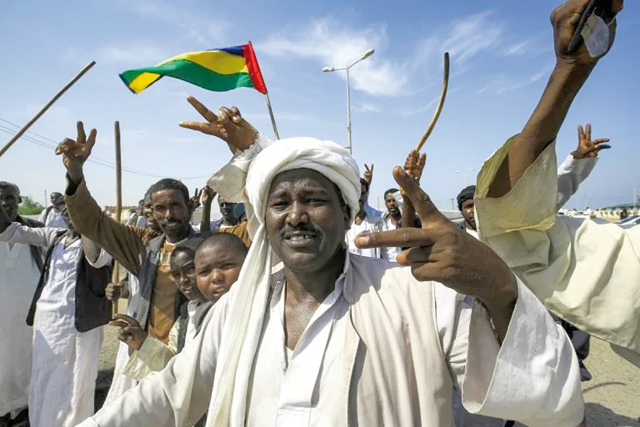PORT SUDAN, Sudan — Under the harsh rule of ex-president Omar Al Bashir, Sudan’s eastern tribes felt abandoned and neglected, even taking up arms against him. But two years after his ouster, they remain marginalised and economically deprived.
For millennia, the tribes living between the borders with Egypt and Eritrea have enjoyed a unique culture, with traditional dress, houses and food.
Sudan’s eastern communities largely belong to the ethnic Beja people who inhabit rocky terrains in the states of Gedaref and Kassala.
They have followed a nomadic life as cattle herders and farmers, wandering the lands between the banks of the Nile to the west and the Red Sea coast on the east.
“The Beja have always been averse to urban life,” said Moussa Saeed, a sociology professor at Red Sea University.
Today around 90 per cent still lead a rural existence living in simple huts covered with jute “despite its harshness”, he added.
For more than a decade under Bashir, the eastern communities were part of the armed struggle against his government protesting against economic neglect, marginalisation and disenfranchisement.
In late 2018, they joined nationwide demonstrations against Bashir’s rule that eventually led to his ouster in April 2019.
But in recent weeks, they have been among protesters blockading the country’s main seaport in Port Sudan and a key route leading to Khartoum, severely straining the already struggling economy.
Like others across Sudan, the Beja supported the transition government installed in August 2019 until the administration led by Prime Minister Abdalla Hamdok signed a peace deal with rebel groups more than a year later.
Exposing the rivalries among the Beja tribes, some have opposed that October 2020 deal, which includes a section relating to east Sudan.
It was signed by parties dominated by the Beni Amer tribe, but excluded other groups such as the Al Hadendoa.
One protest leader, Sayed Abouamnah, said the blockade would continue “until the government heeds our demands... nullifying the parts of the Juba peace agreement on the east which was signed with people who do not represent east Sudan”.
Though the region is known for its fertile fields, is rich in gold mines and is a key maritime trade hub, it is also the most impoverished part of Sudan, ranked by the United Nations as among the poorest countries in the world.
Ancient languages
Another protester said that despite a visit by a government delegation earlier this year their demands had gone nowhere.
“We handed them our demands, which include nullifying the parts of the deal on the east. It has been four months and the government did not take any steps though they promised to get back to us a week after their visit,” said pro test leader Abdallah Abouchar.
The Beja make up roughly around 10 percent of Sudan’s 45 million people, according to the latest official figures published in 2008.
They are split into various tribes that primarily speak two different dialects, Bedawit and Tigre.
Bedawit — spoken by the Al Hadendoa, Al Bosharyeen, Al Amr’ar, Al Arteega and Al Ashraf tribes — is believed to have links to the Meroitic language which thrived during the ancient Kingdom of Kush around 4,000 years ago.
Other tribes like the Beni Amer and Al Habbab, who are believed to have hailed from the Arabian Peninsula, speak Tigre — a Semitic language spoken mostly in northwestern Eritrea.
They share much of their culture and way of life.
The men are also protective of the tribes’ women, especially in rural areas where “they’re not allowed to be seen by strangers”, said tribal history researcher Mokhtar Hussein.
But over the centuries, that co-existence has been marred by tribal rivalries that have spilled over into sporadic fighting, often over land and resources.
‘Quest for equality’
Tensions peaked, particularly between the Al Hadendoa and the Beni Amer tribes, after members of the latter group signed onto a section relating to the east in the October 2020 peace deal.
The latest protests, which broke out on September 17 in Port Sudan, were led by Al Hadendoa tribal leader Al Nazir Tirk, who is demanding the nullification of the deal’s section on east Sudan.
“We are defending a just cause,” he told pan-regional channel Al Hadath last month.
On Friday, Hamdok blamed decades-long “neglect” and “marginalisation” of the east for the latest crisis and has vowed to address it.
But many from the Beja tribes believe the transition has done little to address their grievances.
“We went out against Bashir in a quest for equality,” said Awhag Eissa from Port Sudan.
“This however has yet to be achieved.”
